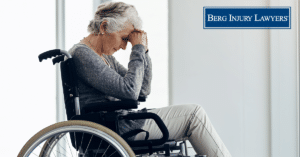Is Nursing Home Abuse Always Physical?
Home » Blog » Is Nursing Home Abuse Always Physical?
by Staff Blogger | May 18th, 2020
 The word abuse usually conjures thoughts of a person being physically assaulted, but there are several forms of abuse that don’t include physical contact, including neglect and emotional, financial, and verbal abuse. Though anyone can suffer these types of abuse, it is especially terrible when it happens to the most vulnerable among us.
Elder abuse is an unfortunate and common part of life for older Americans. The National Institute on Aging says that hundreds of thousands of people over the age of 60 are abused, neglected, or financially exploited each year in the U.S.
Though elder abuse is a serious threat, it’s also a preventable one. By raising awareness of the problem, we can make environments like nursing homes and assisted-living facilities safer for people in their golden years.
The word abuse usually conjures thoughts of a person being physically assaulted, but there are several forms of abuse that don’t include physical contact, including neglect and emotional, financial, and verbal abuse. Though anyone can suffer these types of abuse, it is especially terrible when it happens to the most vulnerable among us.
Elder abuse is an unfortunate and common part of life for older Americans. The National Institute on Aging says that hundreds of thousands of people over the age of 60 are abused, neglected, or financially exploited each year in the U.S.
Though elder abuse is a serious threat, it’s also a preventable one. By raising awareness of the problem, we can make environments like nursing homes and assisted-living facilities safer for people in their golden years.
Examples of Non-Physical Abuse
Elderly people can be subjected to many forms of non-physical abuse, including…
- Emotional and psychological abuse: This occurs when someone says anything threatening or shaming toward an elderly person. Examples include yelling and screaming; use of profanity or insulting nicknames; mocking or criticizing their appearance, interests, and opinions; undermining or dismissing their concerns; excluding them from activities; and preventing them from seeing their visitors.
- Neglect and abandonment: Failing to provide elderly people the care they need and deserve is also a form of abuse. Neglect can include not giving elderly people the nutrition, grooming and hygiene assistance, or medicine they need, as well as leaving them alone for long stretches of time.
- Sexual abuse: Sexual abuse is common among elderly people. In a nursing home setting, it might be perpetrated by staff or even other residents.
- Financial abuse and exploitation: Taking advantage of elderly people through financial exploitation is another common form of elderly abuse. This could involve anything from theft to financial scams to healthcare fraud. Other examples include cashing a resident’s checks without permission, forging a resident’s signature, or coercing a resident to sign documents such as a contract, will, or to grant power of attorney.
All these forms of abuse have dramatic effects on elderly people. Simply ignoring the needs of an elderly person can impact their physical and mental health dramatically.
So, how do you know if a loved is being mistreated?
How to Identify Elder Abuse
If your loved one is elderly, and you’re concerned about their well-being, you should look out for a few of the most common signs of elder abuse.
- Depression
- Anxiety
- Sleeplessness
- Erratic mood swings
- Withdrawal from activities and loved ones
- Poor hygiene
- Unexplained weight loss
- Disheveled appearance
- Unexplained bed sores
- Sudden changes in your loved one’s will or other financial-related documents
- Personal belongings going missing
- Absence of services or amenities that have been paid for or should be included in nursing home fees
When you notice these signs of abuse, it should trigger alarm bells. Your loved one might be hesitant to talk openly about their experiences. When abuse occurs in a nursing home setting, they might fear retaliation from nursing home staff or other residents.
How to Talk to Your Loved One About Abuse
If you suspect that your loved one is being abused, create a safe space to speak to them. You want to make sure that the discussion involves only the two of you or includes only people that your loved one feels comfortable with.
Let your loved one know that their situation doesn’t need to be this way. Tell them that you can help and that the mistreatment can end. If your loved one doesn’t want to talk about their mistreatment, simply let them know that you are available should they change their mind.
Whether or not your loved one voices concerns, you might still want to act on their behalf. We regularly hear from people who have loved ones in potentially unsafe nursing homes and simply don’t know where to turn next.
At Berg Injury Lawyers, we know how these cases typically unfold, and it’s important for you to know that abuse will not stop on its own. It might seem like an impossible situation, but help is available.
Where to Turn if Your Loved One Is Being Abused
For immediate assistance reporting a nursing home or assisted-living facility, find your local adult protective services agency. The National Center on Elder Abuse is a great resource for anyone who wants to learn more about elder abuse prevention.
Negligent nursing homes should be held accountable. Many people with mistreated loved ones look to the legal system for justice. Filing a nursing home abuse or injury claim gives the abused and their loved ones the opportunity to demand compensation for the damages they’ve suffered.
When you take legal action against a nursing home, you aren’t just demanding payment for the harm your loved one has suffered; you’re also making sure that they’ll have costs of future care covered.
These claims are a chance to hold negligent facilities accountable for the harm suffered by their residents. By taking a stand, you might also prevent other elderly people from being mistreated at a negligent nursing home or assisted-living facility.
If You Want Help, Contact Berg Injury Lawyers
We are committed to holding negligent nursing homes responsible. Whether you believe your loved one was subjected to physical, emotional, verbal, or any other form of abuse, know that you have options available.
Let our California nursing home abuse attorneys hear your story, so we can assess your case at no cost. We have years of experience handling elder abuse and nursing home abuse cases, and we know how important these claims can be for families.
Contact Berg Injury Lawyers today to schedule your free consultation.
 The word abuse usually conjures thoughts of a person being physically assaulted, but there are several forms of abuse that don’t include physical contact, including neglect and emotional, financial, and verbal abuse. Though anyone can suffer these types of abuse, it is especially terrible when it happens to the most vulnerable among us.
Elder abuse is an unfortunate and common part of life for older Americans. The National Institute on Aging says that hundreds of thousands of people over the age of 60 are abused, neglected, or financially exploited each year in the U.S.
Though elder abuse is a serious threat, it’s also a preventable one. By raising awareness of the problem, we can make environments like nursing homes and assisted-living facilities safer for people in their golden years.
The word abuse usually conjures thoughts of a person being physically assaulted, but there are several forms of abuse that don’t include physical contact, including neglect and emotional, financial, and verbal abuse. Though anyone can suffer these types of abuse, it is especially terrible when it happens to the most vulnerable among us.
Elder abuse is an unfortunate and common part of life for older Americans. The National Institute on Aging says that hundreds of thousands of people over the age of 60 are abused, neglected, or financially exploited each year in the U.S.
Though elder abuse is a serious threat, it’s also a preventable one. By raising awareness of the problem, we can make environments like nursing homes and assisted-living facilities safer for people in their golden years.


